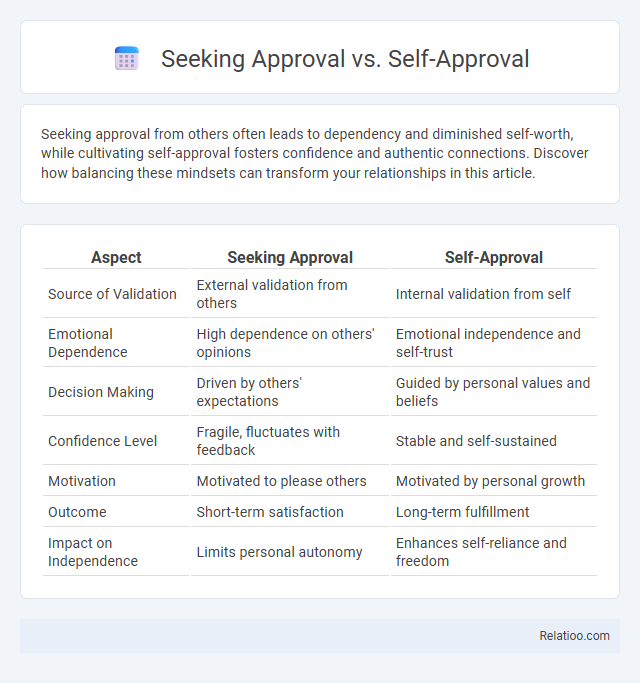Seeking approval from others often leads to dependency and diminished self-worth, while cultivating self-approval fosters confidence and authentic connections. Discover how balancing these mindsets can transform your relationships in this article.
Table of Comparison
| Aspect | Seeking Approval | Self-Approval |
|---|---|---|
| Source of Validation | External validation from others | Internal validation from self |
| Emotional Dependence | High dependence on others' opinions | Emotional independence and self-trust |
| Decision Making | Driven by others' expectations | Guided by personal values and beliefs |
| Confidence Level | Fragile, fluctuates with feedback | Stable and self-sustained |
| Motivation | Motivated to please others | Motivated by personal growth |
| Outcome | Short-term satisfaction | Long-term fulfillment |
| Impact on Independence | Limits personal autonomy | Enhances self-reliance and freedom |
Understanding the Need for Approval
Seeking approval involves relying on external validation to feel accepted, while self-approval emphasizes internal validation and personal standards for self-worth. Reassurance seeking is the repetitive need for confirmation from others to alleviate doubt or anxiety, often linked to insecurity. Understanding the need for approval reveals its roots in emotional security, highlighting the importance of balancing external feedback with cultivating self-acceptance to maintain mental well-being.
The Psychology Behind Seeking Validation
Seeking approval involves relying on external validation from others to feel worthy, often leading to dependence on social feedback for self-esteem. Self-approval, in contrast, stems from internal validation where You cultivate confidence and self-acceptance independent of outside opinions. Reassurance seeking is characterized by repetitive behavior to gain confirmation from others, which can perpetuate anxiety and undermine Your psychological resilience.
External Validation: Pros and Cons
Seeking approval relies heavily on external validation, providing immediate social acceptance but risking dependency on others' opinions for self-worth. Self-approval cultivates intrinsic confidence, promoting long-term emotional resilience, yet may challenge individuals to break away from societal expectations. Reassurance seeking offers temporary relief and clarity but can foster insecurity and undermine autonomous decision-making.
Self-Approval: Building Inner Confidence
Self-approval is the foundation for lasting inner confidence, empowering you to trust your decisions and values without relying on external validation. Unlike seeking approval from others or reassurance seeking, self-approval fosters emotional resilience and autonomy by cultivating a positive self-assessment based on your own standards. Developing self-approval involves consistent self-reflection, recognizing personal achievements, and nurturing self-compassion to strengthen your inner sense of worth.
Signs You Rely on Others for Approval
Signs you rely on others for approval include constantly seeking validation for your decisions, feeling anxious or unsettled without positive feedback, and avoiding risks to prevent disapproval. Your self-worth becomes tied to external opinions, making it difficult to trust your own judgment or embrace mistakes as learning opportunities. This reliance contrasts with self-approval, where confidence stems from internal acceptance, and reassurance seeking, which can be occasional rather than habitual.
Dangers of Chasing External Validation
Chasing external validation through seeking approval and reassurance seeking can lead to a fragile sense of self-worth, as Your happiness relies heavily on others' opinions. This dependency fosters anxiety, undermines authentic confidence, and creates a cycle of constant comparison and doubt. Prioritizing self-approval cultivates resilience and emotional independence, crucial for maintaining mental well-being in a world fixated on external judgment.
Benefits of Cultivating Self-Approval
Cultivating self-approval fosters intrinsic motivation by reinforcing personal values and self-worth, reducing dependence on external validation. This internal confidence enhances emotional resilience, enabling individuals to navigate challenges without constant reassurance seeking. Embracing self-approval supports mental well-being and authentic decision-making, promoting sustainable personal growth.
Strategies to Shift from Seeking to Self-Approval
Shifting from seeking approval to self-approval involves cultivating intrinsic motivation by setting personal values and goals that reflect authentic desires rather than external validation. Practicing mindfulness and self-compassion helps recognize and challenge the need for reassurance seeking, fostering emotional resilience and independence. Building a habit of positive self-talk and celebrating small achievements reinforces self-confidence, reducing reliance on others' opinions for self-worth.
Balancing Social Feedback with Self-Worth
Balancing social feedback with self-worth requires understanding the differences between seeking approval, self-approval, and reassurance seeking. Seeking approval depends heavily on external validation, while self-approval originates from your inner values and confidence, fostering genuine self-esteem. Learning to moderate reassurance seeking helps maintain healthy social connections without compromising your self-worth or identity.
Embracing Authenticity and Self-Acceptance
Seeking approval often stems from external validation, while self-approval is rooted in embracing your authentic self and cultivating self-acceptance. Reassurance seeking can indicate a need for external confirmation, which may undermine your confidence and authenticity. Prioritizing self-approval fosters genuine self-worth and resilience, empowering you to live authentically without relying on others' opinions.

Infographic: Seeking Approval vs Self-Approval
 relatioo.com
relatioo.com